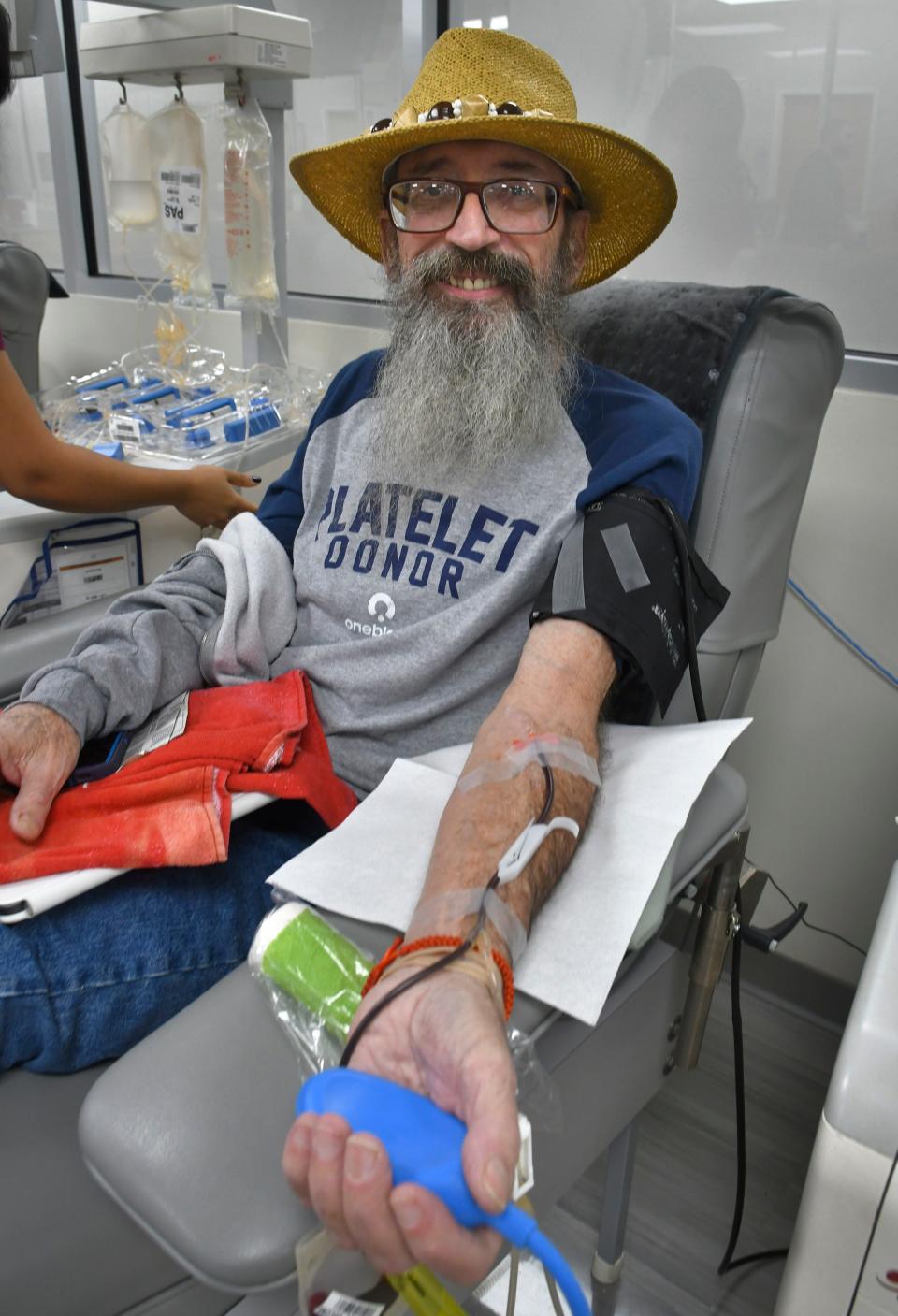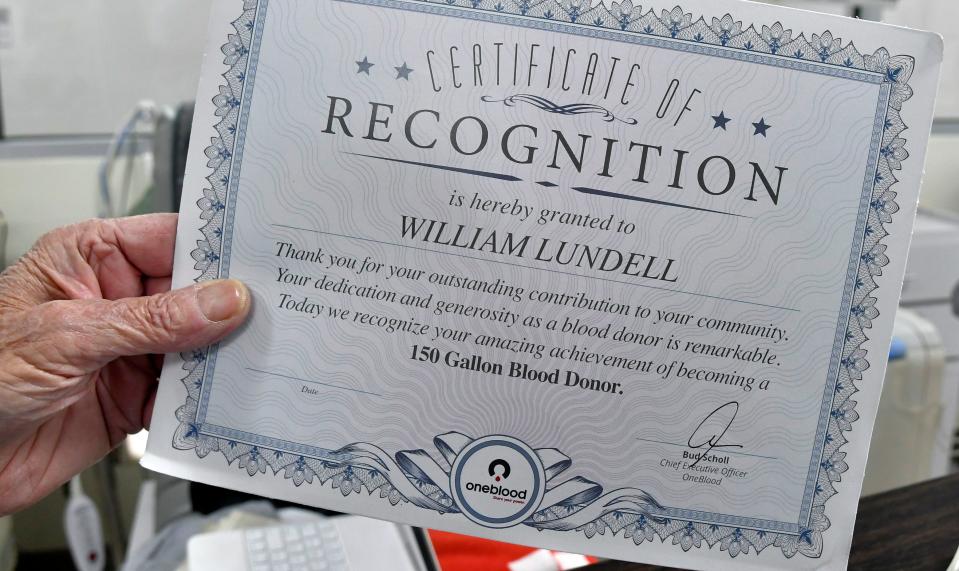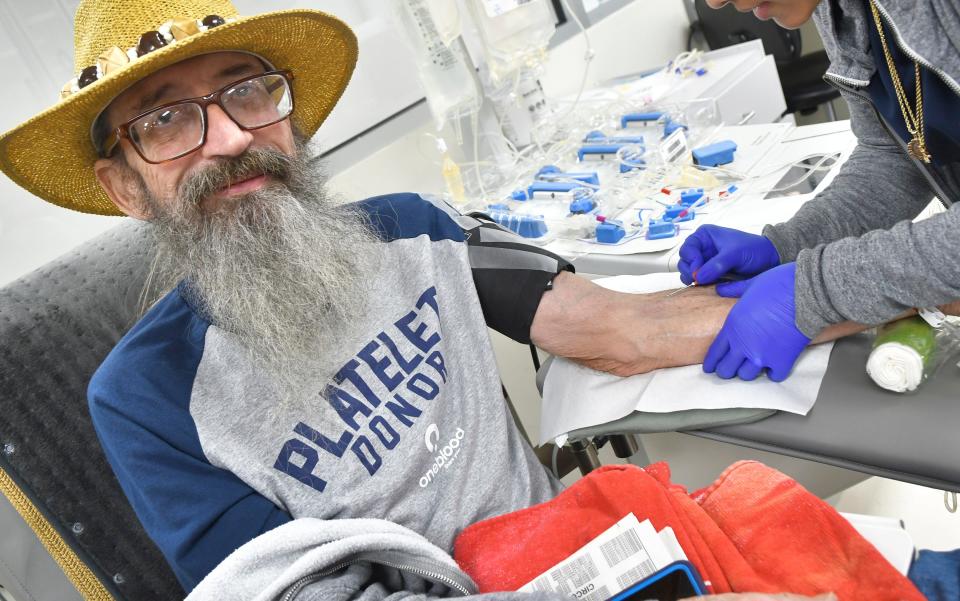He's donated 150 gallons of blood over the years — and he plans to keep it flowing
When Bill Lundell started making regular blood donations, he was in his 30s.
One hundred and fifty gallons and a bucketload of extended arm time later, the Indian Harbour Beach resident is old enough for Medicare.
But while Lundell has reached a milestone not just any blood donor achieves, the 65-year-old is determined to press on.

On Jan. 16, Lundell stuck out his arm yet again at the OneBlood location on Babcock Street in Melbourne.
He always remembers, he said, President John F. Kennedy's 1962 speech on the nation's space effort, in which Kennedy stated, "We choose to go to the moon in this decade and do the other things, not because they are easy, but because they are hard.”
"By the end of this decade I will reach 200 gallons," he said. "My destiny, yet to be determined."
In the beginning, Lundell said, donating blood was about an employee pay incentive offered by the city of Melbourne, where he worked at the time. The offering encouraged employees to take part in a wellness program that stressed community involvement, and blood donation "seemed the right fit," he said.
Over the years, as he quit drinking and smoking and lost weight, topped with blood donation, Lundell said, his health improved.
Now, it's about compassion coupled with passion for helping others regain their health. It shouldn't take a natural or manmade disaster, he said, to get people to help save a life.
A mission with meaning
Lundell's mission, his personal blood drive, so to speak, continues to be inspired by others.
This "super donor" thinks of his late mom, a registered nurse, who, like Lundell's father, was a smoker and died with lung cancer. He thinks of Talia Joy Castellano of Orlando, a child he met in 2010 at a donor appreciation dinner. She died of cancer on July 16, 2013. Lundell was moved by her bravery. Knowing his blood could go to a sick child with endless potential really stuck with him, he said.
He thinks, too, of the lyrics to David Bowie's song, "Heroes." Lundell has his own: nurses. Phlebotomists. Doctors. Researchers. Always, the patients on the receiving end of donations.
"There are all these real heroes out there, every day," he said. "Bowie said 'We can be heroes, just for one day' ... all I do is plunk my butt down there in the chair. I used to be out protesting, politics, writing letters to the editor, everything. I've kind of slacked off. But this I can do, and I've been doing it all these years."
As of 2021, 325 Floridians had donated more than 100 gallons of blood.
So 150 gallons? Think about it.
Consider the room it takes in your fridge for one gallon of milk or juice. Then add 149 more gallons, and think about each one weighing around 8 pounds.
Suffice it to say, it's a heavy-duty donation Lundell, who hit the 100-gallon mark in 2014, has made over the years.
"He's among the top-notch donors ... we call people like Bill 'donors at a higher calling,'" said Pat Michaels, OneBlood director of media and public relations.
"A lot of lives depend on them"
For quite a while now, Lundell has donated platelets rather than whole blood. His blood type is A+, which both OneBlood and the American Red Cross describe as one of the "ideal types" for platelet donation. In this process, platelets are collected from the blood, "returning the rest to you in a specialized donation process known as automation or apheresis," OneBlood says.
A single donation of platelets can yield several transfusable units, the Red Cross says, "whereas it takes about five whole blood donations to make up a single transfusable unit of platelets."
How does Lundell fill the time during the procedure, which can take between two and three hours? That's easy, he said.
"Well, I'm a news junkie. I have my iPad with me if I want to pop online, but usually I'll talk with the people there and stuff; talk to the people across from me," he said.
"I'm on Tik Tok and X now, so I'll check that out ... the time goes pretty quickly."
Satellite Beach resident Joanne Regan, whose husband, Raj S. Shah, died in 2007, appreciates Lundell's donations from a very personal place.
"While whole blood donation is really important, platelet donation is crucial to cancer patients who are trying to sustain their lives until their treatment works," Regan said, whose husband was 26 when diagnosed with chronic myelogenous leukemia, and lived for 18 years after being told he might survive for five.
Raj received countless platelet donations over the years, she said.
"Platelets are what give people hope until their treatment ... my huband used to get spontaneous nosebleeds and that's how we knew his platelets were critically low," Regan said.
"If it wasn't for people like Bill, who make it their mission to save lives, he would not have survived long enough to even consider treatment options."
Need for blood is constant
There are many reasons patients need blood, OneBlood shares on its website:
More than 25% of the blood supply is used by patients battling cancer.
1 out of every 83 childbirths will require a blood transfusion.
The second most common medical procedure in U.S. hospitals is the transfusion of blood and blood products.
3.2% of the blood supply is used to treat pediatric patients.
Blood donors must be at least 16 years old, with a parent's permission at that age; platelet donors must be 17, according to OneBlood. Platelets can be donated every seven days, with OneBlood recommending donations every 14 days. Donors can give up to 24 times a year.
There is no upper age limit, as long as a potential donor is healthy and is able to answer a questionnaire and consent to the donation, said Courtney Minnoe, donor services supervisor for the OneBlood team in Melbourne.

The staff at the Melbourne OneBlood location even threw a little recognition party for Lundell when he hit 150 gallons in December.
Donors' gifts don't go unheralded here.
"They come in here and do this from the bottom of their hearts," said Minnoe.
"They really want to give back. There are donors who come in beccause they have experience with it, because they lost someone to cancer and want to do it in remembrance of family members ... they're trying to give back to the community."

Lundell, he said, simply wants to do something he knows matters to so many.
"In the beginning, it was different. I didn't know where the blood was going. But over the years, I've donated for people I know personally, too," he said.
"I have a dear friend in Hawaii who's sick right now with colon cancer. I go to Hawaii a lot and I've donated there. She called me Sunday and said, 'I'm going to have a blood transfusion.' I said, 'Why the hell didn't you tell me? I could've have been there.'"
Britt Kennerly is education/breaking news editor at FLORIDA TODAY. Contact Kennerly at 321-917-4744 or bkennerly@floridatoday.com. Twitter: @bybrittkennerly Facebook: /bybrittkennerly
This article originally appeared on Florida Today: Stuck on saving lives: Brevard blood donor passes 150-gallon mark

